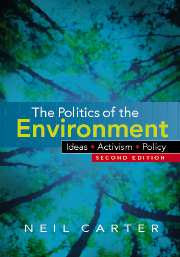Book contents
- Frontmatter
- Contents
- List of figures
- List of tables
- List of boxes
- Preface to the second edition
- Acknowledgements
- Abbreviations
- Glossary
- 1 Introduction
- PART 1 Theory: thinking about the environment
- PART 2 Parties and movements: getting from here to there
- PART 3 Environmental policy: achieving a sustainable society
- References
- Index
PART 1 - Theory: thinking about the environment
Published online by Cambridge University Press: 05 June 2012
- Frontmatter
- Contents
- List of figures
- List of tables
- List of boxes
- Preface to the second edition
- Acknowledgements
- Abbreviations
- Glossary
- 1 Introduction
- PART 1 Theory: thinking about the environment
- PART 2 Parties and movements: getting from here to there
- PART 3 Environmental policy: achieving a sustainable society
- References
- Index
Summary
Part I examines how political theorists think about environmental issues. Specifically, it asks the question: is there a sufficiently comprehensive, coherent and distinctive view of environmental issues to justify talking about a green political ideology which, following Dobson (2000), can be called ecologism?
There has been a phenomenal growth in the literature on environmental philosophy and political thought in recent years. The distinction between reformist and radical approaches provides a useful shorthand means of categorising two quite different ways of thinking about environmental problems. Broadly speaking, reformist approaches adopt ‘a managerial approach to environmental problems, secure in the belief that they can be solved without fundamental changes in present values or patterns of production and consumption’ whereas radical positions (i.e. ecologism) argue that ‘a sustainable and fulfilling existence pre-supposes radical changes in our relationship with the non-human natural world, and in our mode of social and political life’ (Dobson 2000: 2). In short, reformist and radical approaches represent qualitatively different interpretations of environmental problems.
Dobson also makes the bigger and bolder claim that ecologism should be regarded as a distinct political ideology. To cohere as an ideology, ecologism must have three basic features: (1) a common set of concepts and values providing a critique of the existing social and political systems; (2) a political prescription based on an alternative outline of how a society ought to look; (3) a programme for political action with strategies for getting from the existing society to the alternative outline.
- Type
- Chapter
- Information
- The Politics of the EnvironmentIdeas, Activism, Policy, pp. 11 - 12Publisher: Cambridge University PressPrint publication year: 2007

